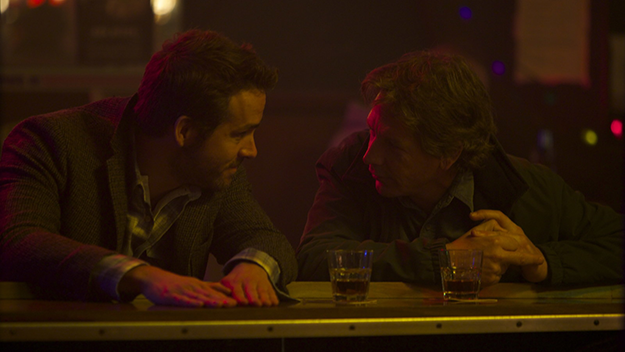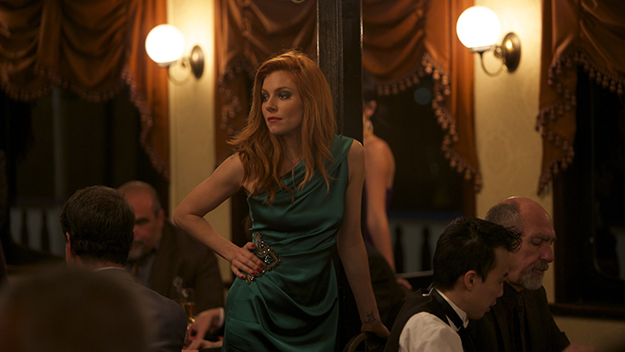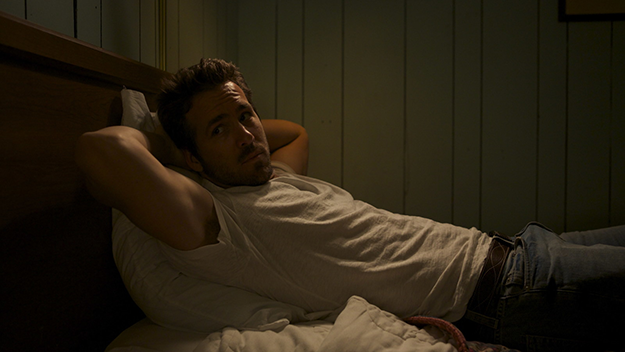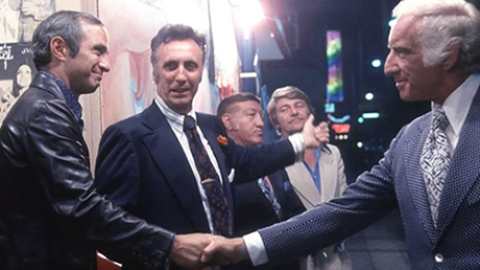Film of the Week: Mississippi Grind

Not being a gambling man, I tend to get a little lost with any film that depends for comprehension on your familiarity with particular card games. Most mainstream gambling movies try to make things at least a little easier for those of us who aren’t familiar with the intricacies and traps of Texas Hold ’Em, but still you can feel completely at sea if you don’t recognize the value of a certain hand. No doubt there are movies with entire narrative structures specifically modeled on the rules of blackjack or five card stud, and I realize that some sublime cerebral twists of narrative are flying way over my head, but so it goes; I’ve long been reconciled to missing out on the fine points of baseball movies too.
But for those of us not attuned to the subtler nuances of gaming, there are other signals we can rely on in a movie: a sudden tense quickening of strings on a soundtrack, or a microscopic shift in the impassivity of an actor’s poker face. Card game movies tend to maximize the effect of a controlled performance, and of the power of a brief close-up, through the language of “tells”—those little physical signals by which players unconsciously reveal all about the state of their game and their thinking.
Mississippi Grind, the new film written and directed by Anna Boden and Ryan Fleck (Half Nelson, Sugar), is partly about the power, and the unreliability, of those tells. Gerry (Ben Mendelsohn) is an estate agent from Iowa who’s addicted to gambling, ever more hopelessly, and who spends a great deal of time sitting in his car listening to an instructional CD called 200 Poker Tells, which lists the signs by which you can gauge an opponent’s character and thought processes, and ideally, guess their cards: they might babble at the table, rub their nose, furrow their brow. Master this secret language, and you’ve mastered the table. But, for all his studying, Gerry masters nothing, and understands nothing, least of all himself.

Early in Mississippi Grind, we see him at one of the functional, drearily brown casinos that are the film’s main locales—we’re a million miles from Vegas, let alone Monaco or Macau—and there at the table is one of those babblers he’s learned to watch out for. But this is an affable, charismatic babbler—Curtis (“Like Mayfield”), played by Ryan Reynolds. He’s a voluble extrovert, liberal with rounds of superior bourbon, and with tales of a legendary gambler friend, one Tony Roundtree. Curtis claims to be more a darts player than anything else, and makes a big show of insouciance (“I don’t care about money . . . I just like to play”). Gerry is a middle-aged heterosexual still aching for his ex-wife; still, he’s romantically smitten with Curtis, the way that straight men spark for each other in buddy movies, especially of the road or gambling variety, and Mississippi Grind is both of these.
Gerry desperately wants a sharper, more confident man like Curtis to whisk him away from the ashtray of his life: a catastrophic career, a home where his only close relationship is with his cat, a mountain of debt. There’s a lovely scene in which he sits down in a diner with an elegant woman played by Alfre Woodard, silkily low-key; she’s tender towards him, seemingly solicitous, and they appear to be old flames. They are, after a fashion. She’s a loan shark, and Gerry’s been so deep in hock to her for so long, it’s almost as if they’re lovers; that won’t stop her sending the muscle after him before long.
Gerry runs into Curtis again and it’s as if fate has thrown them together (“It’s a sign!” jubilates Gerry, a past master of incompetence in reading signs). He’s convinced that smooth-talking, genial Curtis—himself nothing but a more beautiful loser—will be his good-luck charm (“My big handsome leprechaun”). He signs up for a trip to New Orleans with him, to take part in a big poker game. And where’s the harm, after all? It will only cost Gerry $25,000 to get in on the action… One way or another, Gerry and Curtis end up deeply entangled: the seemingly fated nature of their relationship is nicely brought out later, when they both—separately, and in different places—get punched out.

The duo take a ride on a riverboat, and Curtis’s sometime girlfriend, hooker Simone (Sienna Miller), kits them out in dinner jackets; her friend Vanessa (Analeigh Tipton), a gauche young lost-soul-in-the-making, shyly charms Gerry with a magic trick, and he reveals a hidden side to his character by playing her a creaky but heartfelt Satie piano piece. Simone has a nice pithy riposte to Curtis when he invites her to join the trip: “What about condoms? Am I going to have to work on this journey, or are you going to cover my expenses?” She’s wise to what it means to be the lucky charm, in turn, to a man like this.
But Simone and Vanessa feel like well-worn stereotypes in a story about a romance between two men whose relationships with women hinge largely on whether or not they can see them as a living version of the Queen in their hand. That’s made evident in one of the best scenes. Gerry has literally decided that if he gets dealt a Queen, he will visit his ex-wife in Little Rock. The visit is brief and pithy, and arguably doesn’t quite give a fine Robin Weigert enough to do as the woman who saw through Gerry long ago; but it’s a potent sequence, a reminder that you can never go home again, and a chilling, rather than poignant, illustration of the abjection to which Gerry long ago committed himself. Curtis, meanwhile, turns out to have his own imperious Queen—his mother, a smoky-voiced bar singer played by country-rock doyenne Marshall Chapman. There’s an element of some theatrical nighthawkery in this scene, as if the movie had suddenly stepped into the scenario of an early Tom Waits ballad, but it’s potent nonetheless.
Mississippi Grind is a nostalgic film, its characters forever in search of those bounteous good times of the past, that are purely in their minds, while its makers are looking back to a certain type of free-ranging, melancholic, narratively loose American movie, the sort we think of when we get dewy-eyed about the Seventies. The title refers specifically to a horse that our guys bet on, but it also suggests the drudgery of the Southern gaming circuit—and, of course, it echoes California Split, Robert Altman’s green-baize buddy movie of 1974. There’s another period allusion, to The Gambler, when we finally meet the vaunted Tony Roundtree: he’s none other than that film’s director James Toback.

Boden and Fleck certainly work up a vintage feel, not least in the casting—right down to the faces of the miscellaneous gamblers we meet, no glamorous high-rollers but weathered sloggers who have worked long and hard on their inscrutability. The performances are terrific across the board: Miller gets better and more substantial all the time, and there’s always a restrained integrity to her playing; while Analeigh Tipton, rapidly graduating out of kooky-cute parts, hasn’t even begun to show what she’s capable of. And Mendelsohn and Reynolds are superb. In Mendelsohn’s case, that goes without saying: even when films wheel him on as eccentric support, as if mainly to boast that they have Ben Mendelsohn in their arsenal (the fine Slow West, the wretched Lost River), he’s good.
Reynolds, meanwhile, is one of those actors you think you can live without, yet who constantly surprise you (I totally bought him in the much-maligned The Captive). I always thought his persona and looks were a little too coarse to convince as an urbane smoothie in those Hugo Boss ads, but that coarseness works superbly here. His Curtis is an ordinary neighborhood charmer relying too hard on bonhomie and native wits to stand in for actual capability. With his just-sleek-enough (but presumably cheapish) sports jacket, he’s cool, slick but kind of dopey—and so a plausible hero to someone like Gerry, who has mediocre standards for man crushes.
As for Gerry, the film triumphs to make this smeared roadkill of a man highly sympathetic. Mendelsohn lets him twinkle and flirt a little—Gerry is a hopeless romantic. But above all, he’s a bitterly tired man: seen in the morning after a night at the table, Gerry has that mildewed, waxy pallor that Mendelsohn seems to be able to turn on at will in certain roles (Killing Them Softly, The Place Beyond the Pines). Gerry is addicted not so much to gambling, as to losing—and there’s an extraordinary moment when his luck changes and it becomes clear that winning just isn’t his style, just as some people are deeply uncomfortable accepting compliments. His folly and his devotion to catastrophe become shockingly evident when he decides to cap an anomalous burst of good fortune by staking it all on a flamboyant, desperate leap into the void. By which I mean that he’s leaping not just into the unknown, but totally into the void—as if the abyss is really his kind of place.
As you’d imagine with a Southern road movie, Mississippi Grind is steeped in atmosphere—both visual and musical, with much ripe barroom blues on the soundtrack and played live. But the atmospherics privilege a certain staleness and deadness: the casinos our heroes frequent are anonymous, businesslike, and faded, at best the Walmarts of the gambling circuit. The world outside is a dead grey and brown, even the grass outside Gerry’s house matching his sorry demeanor. There’s a certain touristic element to Gerry’s and Curtis’s travels: we see shots of landmarks like the Stax Museum and Sun Studios in Memphis, which suggests a certain postcard quality, but these places are markers of a lost past commodified as heritage. Shot with an eye for claustrophobic mood by the filmmakers’ regular DP Andrij Parekh, and with Jade Healy’s production design perfectly evoking a certain glitter-gilded drabness, the film achieves a resonant intimacy, a sense of aimless drift in an endless American night. Mississippi Grind is a derivative film, one that looks back ruefully, but that makes it all the more haunting and emotionally effective. This is the road movie as a search for redemption—“redemption” strictly in the tawdriest, cash-in-hand, pawnshop sense of the word.





